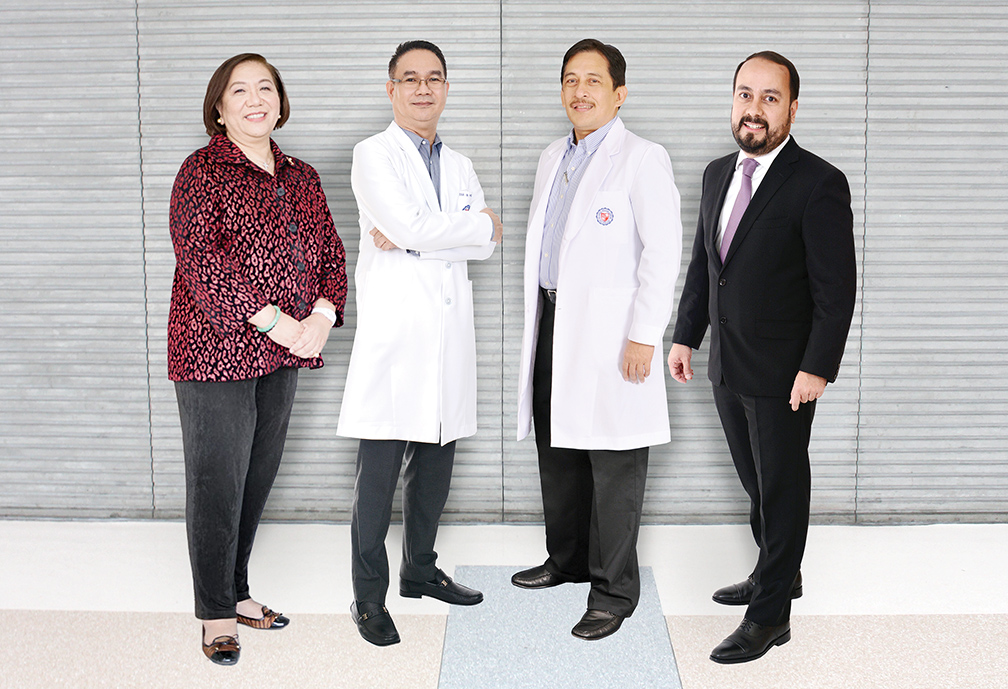Fostering the tradition of excellence

When St. Luke’s Medical Center-Global City opened in 2010, it was touted as a new generation medical facility that is set to change the face of hospitals in the country. It was designed to take a more holistic approach to healthcare—one that takes the healing environment into consideration.
“We built this to be more welcoming. While patient care remains our primary objective, we have put almost equal care into our patients’ surroundings,” says Mr. Rafael C. Solis, St. Luke’s-Global City SVP and Head for Hospital Operations.
He explains that rooms are modern and less cluttered. Even the lighting conditions, noise level, air quality, and infection control were considered. “There are so many sections of the hospital that are more like what you’ll find in 5-star hotels. Beyond aesthetics, the rooms here, as well as the rest of the areas, have been designed to improve safety, patient and staff satisfaction, and friendliness to the environment,” explains Mr. Solis.
Excellent medical care
St. Luke’s-Global City’s state-of-the-art approach to healthcare combines the expertise of locally and internationally trained doctors and medical professionals with industry-leading technologies to deliver excellent medical care.
“Research and innovation are crucial drivers of change. By investing in homegrown talents, our readiness to adopt latest global technology trends, and through numerous partnerships, we are able to facilitate the development of innovative, high quality affordable products that can transform lives for the better,” says Dr. Arturo S. De La Peña, St. Luke’s-Global City SVP and Head for Medical Practice Group and Medical Director.
In July, St. Luke’s-Global City opened St. Luke’s Aesthetics that offers dermatology and plastic surgery services using the latest technology while observing strict standards in patient safety.
Interestingly, St. Luke’s Aesthetics is currently the only facility in the country that offers hybrid fractional laser resurfacing, a new technology that treat a variety of skin concerns ranging from mild to severe, providing deep dermal rejuvenation and epidermal renewal.
That same month, St. Luke’s-Global City’s team of robotic thoracic surgeons performed the country’s first robotic lung resection (removal of a portion of the lung where cancerous mass was detected) using the third generation da Vinci Si surgical system.
The three surgeons involved, Dr. Edmund E. Villaroman (lead surgeon), Dr. Karlos R. Aleta and Dr. Mariam Grace A. Delima (assistant surgeons), are now regarded as pioneers in advanced minimally invasive thoracic surgery in the country.
Robotic surgery is beneficial in performing surgeries in a confined space like the chest and the da Vinci Endowrist technology provide the surgeons a wider range of motion than the surgeon’s hands. Complex procedures can therefore be performed precisely even in hard-to-reach areas not normally accessible by the hand or even with laparoscopic instruments. To date, St. Luke’s has already performed more than 800 robotic surgeries covering general surgery, urologic, ENT-HNS, and gynecologic cases.
Also in July, St. Luke’s-Global City opened the Eduardo M. Cojuangco, Jr. and Ramon S. Ang Center for Organ Transplantation. The Center hopes to uplift the status of organ donation, as well as, lead in shaping Filipinos’ mindset about organ donation in order to create a new culture that hopes to heal and save more lives of countless Filipinos with end-stage renal disease.
The center is set to initiate a program geared toward training and generating resources for deceased organ procurement, encouraging families of deceased patients to donate their loved one’s organs in order to give others a new chance at life.

Advanced heart procedures
In September, St. Luke’s-Global City established the Center for Structural Heart and Vascular Diseases that seeks to optimize the hospital’s resources to fully perform advanced and highly sophisticated cardiovascular procedures; assemble all the hospital’s dedicated, knowledgeable, and skilled specialists; and acquire the necessary sophisticated medical imaging equipment and medical support systems.
The center is also designed to optimize St. Luke’s-Global City’s systems of care to ensure unmatched post-operative care and best procedural outcomes.
It was February of 2012, when St. Luke’s-Global City team of physicians led by Dr. Fabio Enrique Posas and Dr. Estanislao De Castro performed the first transcatheter aortic valve replacement or TAVR in the Philippines.
TAVR is a minimally invasive technique designed to replace diseased aortic valves. During the procedure, a bioprosthetic valve is implanted through a catheter which is usually inserted via small incision in the femoral artery at the groin area. Guided by
X-rays and ultrasound, the catheter is then sent to the diseased aortic valve and once in the position, the bioprosthetic valve is deployed.
This month, the TAVR team of St. Luke’s-Global City has just surpassed 100th milestone—the most number performed in the Philippines and ranked third in Southeast Asia. The St. Luke’s TAVR team is proud to have a procedural success rate of 98 percent.
Pioneering work
Just recently, St. Luke’s-Global City once again achieved pioneering work when it became the first hospital in the Philippines to implant a left ventricular assist device (LVAD) on a 70-year-old patient.
An LVAD implantation is a surgical procedure used to restore heart function and blood circulation inhibited by severe heart failure. It is a battery-powered mechanical pump that is surgically implanted into the patient’s chest and abdomen
According to Dr. Donald C. Cristobal, St. Luke’s-Global City Cardiologist with Advanced training in Echocardiography and the attending physician of the LVAD patient, the challenge was the fact that the patient is no longer fit to fly abroad due to his medical condition, and no one has performed an LVAD implantation here in the Philippines.
In consultation with Dr. Jorge M. Garcia and Dr. Joseph B. Barril, two of the handful of Filipino Cardiothoracic surgeons who are internationally trained in all aspects of heart transplantation, Dr. Cristobal suggested the possibility of performing the LVAD procedure at St. Luke’s-Global City.
“An LVAD implantation is a surgical procedure used to restore heart function and blood circulation inhibited by severe heart failure. It is a battery-powered mechanical pump that is surgically implanted into the patient’s chest and abdomen,” explains Dr. Cristobal.
After three weeks of cardiac rehabilitation, the LVAD recipient’s kidney functions have returned to almost normal and thus, his fluid intake is no longer limited. Even the swelling of his lower legs has disappeared. Most importantly, the patient could now move around normally with minimal assistance and without shortness of breath.
“With the success and availability of the procedure here, I am glad that advanced heart failure patients will no longer need to travel abroad to get this implant,” says Dr. Cristobal, who looks forward to making this procedure broadly available in the Philippines.
Innovative technology
The hospital’s Institute of Digestive and Liver Diseases also boasts of the country’s first: the Center for Advanced Gastrointestinal Endoscopy that provides highly advanced endoscopy procedures that could provide ultra high-definition images and easier identification of small intestinal polyps that regular endoscopes may likely miss.
Moreover, St. Luke’s-Global City acquired CryoConsole System—the first of its kind in the Philippines—that makes it possible to perform minimally invasive catheter ablation procedure for patients suffering from atrial fibrillation.
Come 2021, St. Luke’s Medical Center will be regarded as among the most revolutionary academic medical center complexes in the ASEAN region, a hospital designed to create an environment that is safe, functional, as well as pleasant for patients and visitors. It will be one of the most environmentally friendly and sustainable hospitals in the region.
“We realized a few years back that St. Luke’s Medical Center-Quezon City had outgrown its old home so the management decided to build a new one located at the back of the present building. This upcoming academic medical center complex of St. Luke’s-Quezon City will try to break out of the mold of what people might think of when they think of a hospital. Planning will take about two years and another three allotted for the construction. Four years from now, we envision this facility to be one that embodies new designs meant to reduce waste and improve the patient experience,” shares Dr. Edgardo R. Cortez, President and CEO of St. Luke’s Medical Center.
With the scheduled opening of its new academic medical center complex, St. Luke’s-Quezon City will be marking the start of an era of one hospital building that has been standing proud since 1961.
The present hospital building will eventually be demolished once the new complex becomes fully operational.
Fond memories
“There are so many fond memories from this place. For a 58-year-old facility, St. Luke’s-Quezon City has remained at the forefront of patient-centered care and technological innovation,” says Dr. Annabelle R. Borromeo, St. Luke’s-Quezon City SVP and Head for Hospital Operations.
Dr. Borromeo says that despite its current physical limitations, it is far from outliving its glory days as the hospital has shown that it can deliver the highest quality service and world class care. “For us to get international accreditation is a reflection of St. Luke’s-Quezon City abilities,” says Dr. Borromeo.
Accredited by the Joint Commission International both as a hospital and an academic institution, St. Luke’s-Quezon City continues to be at the forefront of medical advances through state-of-the-art facilities and clinical practice.
In 2003, St. Luke’s-Quezon City earned the distinction of being the first hospital in the Philippines and the second in Asia to be awarded the JCI accreditation. It is also the country’s first to be accredited as an Academic Medical Center in 2016.
The JCI survey is conducted every three years to ensure that every hospital organization’s policies, procedures and evaluation methods are up-to-date and compliant with worldwide standards (getting a JCI accreditation means the quality of healthcare that
St. Luke’s-Quezon City offers is benchmarked with the highest standards of care and safety practiced by other renowned hospitals around the world).
A regional gem
“I have seen it grow from what it was 28 years ago to what it is regarded today. St. Luke’s-Quezon City will continue its quality medical care in today’s challenging environment and remain as one of the region’s gems in the healthcare industry,” assures Dr. Jose B. Moran, St. Luke’s-Quezon City SVP and Head for Medical Practice Group and Medical Director.
He shares that St. Luke’s has moved towards patient-centered care. “Patients are no longer regarded as passive participants. These days, patients are allowed to make informed decisions together with the doctors. A respectful, trusting relationship was developed. Such collaborative and patient-centered care model motivated us that we set up a two-storey building—The Concierge at St. Luke’s—dedicated to private, international, and HMO patients of St. Luke’s-Quezon City,” says Dr. Moran.
Dr. Moran says “patient safety, patient experience, and satisfaction” will still be St. Luke’s main priority over the next few years. “With patients becoming more discerning than ever before, fostering patient engagement is critical. This is why St. Luke’s-Quezon City is finding more ways to engage patients throughout the entire continuum of care.”
By Charles E. Buban
ADVT














